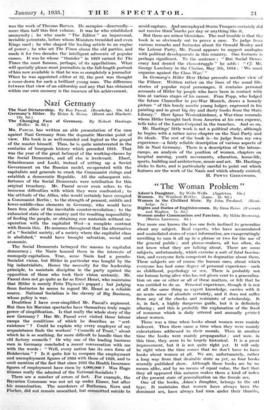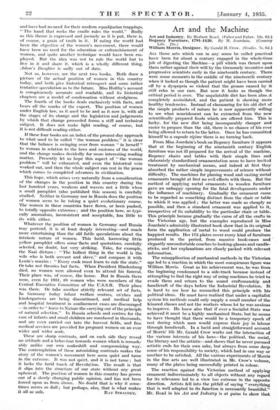The Woman Problem "
Women under Communism and Fascism. By Hilda Browning. (Martin Lawrence. 6d.)
Tine more one knows the less one feels inclined to generalize about any subject. Real experts, who have accumulated and assimilated stores of exact information, are exasperatingly unwilling to sum it all up in a phrase or two for the use of the general public ; and phrase-makers, all too often, do not know what they are talking about. There are some
subjects, unfortunately, which exercise a sort of fatal fascina- tion, and everyone feels competent to dogmatize about them.
These subjects are of course the human ones, about which everyone has had sonic degree of personal experience—such as childhood, psychology or sex. There is probably not one human being alive who has not given vent to a generaliza-
tion on one or other or all of these matters, or felt that he was entitled to do so. Personal experience, though it is not at all the same thing as expert knowledge, carries with it
an acute sense of absolute certainty, and it does not suffer from any of the checks and restraints of scholarship. It is, in fact, a highly dangerous guide, but it is definitely alluring ; and this is probably the explanation of the flood of nonsense which is daily uttered and annually printed about women.
There was a time when books about women were mainly indecent. Then there came a time when they were mainly exhortations addressed to their morals. Then in another time the books were mainly propagandist ; and now, in this time, they seem to be largely historical. It is a great improvement, but it is not quite right yet. It will only be right when the time comes that we don't have to have books about women at all. We are, unfortunately, rather a long way from that desirable state as yet, as four books recently published show. Although these books arc by no means alike, and by no means of equal value, the fact that they all appeared this autumn makes them a kind of index of the present state of generalization on the female sex.
One of the books, Adam's Daughter, belongs to the old
type. , It maintains that women have always been the dominant sex, have always had men under their thumbs,
and have had no need for their modern equalitarian trappings, " The hand that rocks the cradle rules the world." Badly as this theme is expressed and jocosely as it is put, there is, of course, a grain of truth in it. If ruling the world had been the objective of the women's movement, there would have been no need for the education or enfranchisement of women, and quite another technique would have been em- ployed. But the idea was not to rule the world but to live in it and share it, which is a wholly different thing. Adam's Daughter is sadly out of date.
Not so, however, are the next two books. Both draw a picture of the actual position of women in this country today, and both give historical retrospect and some rather tentative speculation as to the future. Miss Holtby's account is conspicuously accurate and readable, and its historical chapters are a model of condensation without stodginess.
The fourth of the books deals exclusively with facts, and bears all the marks of the expert. The position of women under English law, as it used to be and as it now is, with all the stages of its change and the legislation and judgements by which that change proceeded forms a stiff and technical subject. It does not make light reading, of course, but it is not difficult reading either.
If these four books are an index of the present-day approach to what used to be called " the woman problem," it is clear that the balance is swinging over from woman " in herself " to woman in relation to the laws and customs of the world, and the change makes decidedly for more interesting reading matter. Presently let us hope this aspect of " the woman problem " will be exhausted, and even the historical vein worked out, and then the whole subject can rest in the peace which comes to completed advances in civilization.
This hope, which arises very naturally from a consideration of the changes in the position in this country during the last hundred years, weakens and wavers not a little when a small pamphlet (also published this season) is carefully studied. Neither in Germany nor in Russia does the position of women seem to be taking a quiet evolutionary course. The women in these countries have flown, or been pushed, to totally opposite extremes ; and the position here, so typi- cally anomalous, inconsistent and acceptable, has little to do with either.
Whatever the position of women in Germany and Russia may portend, it is at least deeply interesting—and much snore entertaining than the old futile speculations about the intrinsic nature of women. This lurid, harrowing little yellow pamphlet offers some-facts and quotations, carefully selected, no doubt, but very striking. Take, for example, the Nazi dictum : " The holiest thing in the world is the wife who is both servant and slave," and compare it with Lenin's maxim : " Every cook must learn to rule the state." Or take not theories but facts. When President Hindenburg died, no women were allowed even to attend his funeral. Their place was, of course, the home. But in Russia there were, even by 1931, 89 women who were members of the Central Executive Committee of the U.S.S.R. Their place was there. Or take another strictly relevant set of facts. In Germany today infant welfare centres, creches and kindergartens are being discontinued, and medical help and hospital treatment in confinement cases are discouraged —in order to leave to Nature the carrying out of the principle of natural selection." In Russia schools and centres for the care of infants and small children are numbered in thousands, and are even carried out into the harvest fields, and free medical services are provided for pregnant women on an ever wider and wider scale.
These are sharp contrasts, and on each side they reveal an attitude and a behaviour towards women which is remark- ably unlike our own makeshift and compromising way. The contemplation of these astonishing contrasts makes the story of the women's movement here seem quiet and tame in the extreme. It was not quiet, and it is not tame ; but it lacks the lurid touch of Revolution. The result is that it slips into the structure of our state without any great upheaval. The position of women in this country has grown .out of a slowly changing public opinion, and has not been forced upon us from above. No doubt that is why it some- times seems so dull ; but perhaps, also, that is what makes







































 Previous page
Previous page